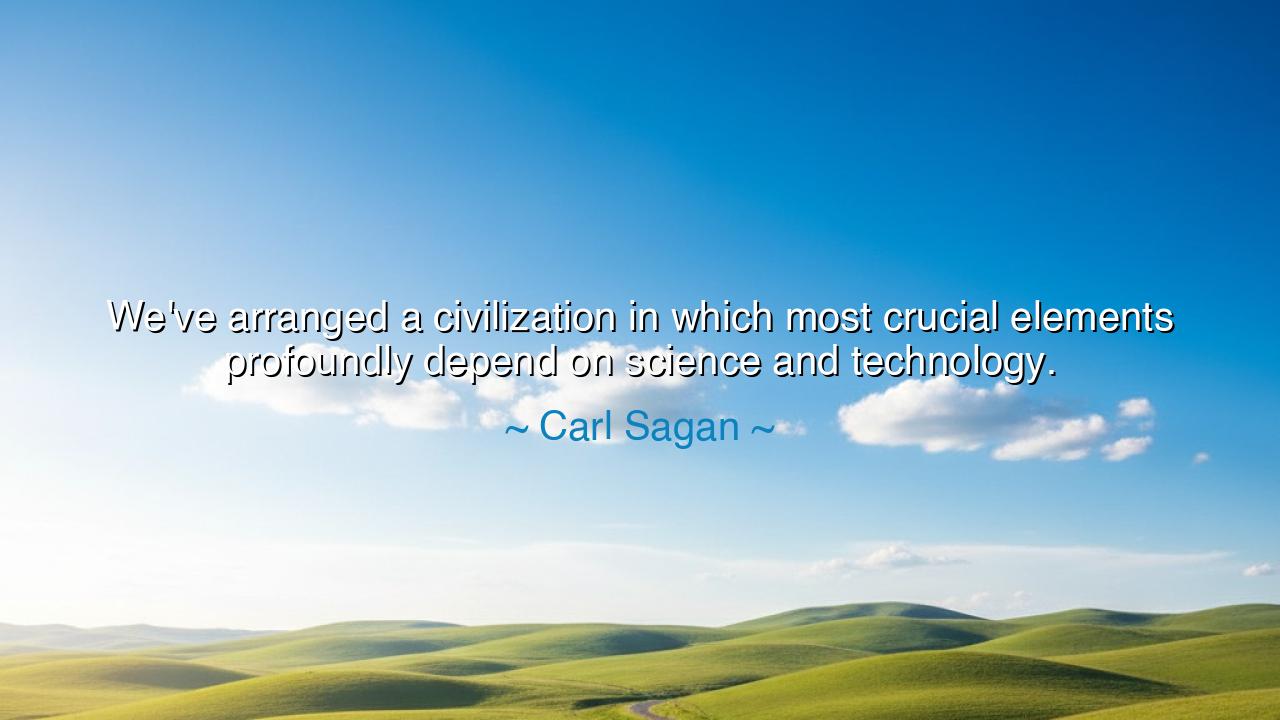
We've arranged a civilization in which most crucial elements
We've arranged a civilization in which most crucial elements profoundly depend on science and technology.






Listen now, O seekers of truth, to the profound wisdom of Carl Sagan, who spoke of a world shaped by science and technology: "We've arranged a civilization in which most crucial elements profoundly depend on science and technology." In this simple statement, Sagan offers a reflection on the deep bond between the world we have built and the advancements of human ingenuity. This is no mere observation, but a revelation of how intimately tied the fabric of civilization is to the mastery of the natural world, and how the forces of science and technology now sustain and propel the world itself.
In ancient times, the wisdom of the world was built upon the observations of the stars, the flow of rivers, the seasons of planting, and the understanding of nature. The great civilizations of Egypt, Greece, and China grew mighty not just through the strength of their armies or the riches of their lands, but through their deep understanding of the laws of nature. They learned to harness the sun’s energy for agriculture, to build pyramids that stood the test of time, to explore the heavens, and to create systems of thought that guided them through life. Their technology was rooted in a deep reverence for science, though they did not yet have the tools or language we possess today. Their achievements were built upon the understanding that the universe, though mysterious, could be comprehended and used for the betterment of humanity.
Yet, Sagan’s words remind us that we have crossed a threshold, where the very foundation of civilization now rests upon science and technology. From the invention of the wheel to the creation of the computer, from the understanding of the laws of motion to the decoding of the human genome, human civilization has become inseparable from science. Think, O wise ones, of the marvels we now take for granted—our communication across vast distances, the ability to travel to far-flung corners of the earth, and even to explore the heavens. These were once dreams, mere whispers of possibility, but they have now become reality, thanks to the tireless efforts of scientists and engineers who have turned the mysteries of nature into tools of human progress.
Consider the story of Isaac Newton, a man whose understanding of the laws of motion and universal gravitation laid the foundation for not only the advancement of astronomy but the creation of technologies that would later allow humans to send satellites into space. His discovery, while rooted in the natural world, set the stage for technologies that now power our lives. The space programs that have taken us to the moon, the satellites that allow us to communicate instantly, and the medicine that has cured countless diseases—all owe their existence to the profound understanding of science that Newton and others like him provided. This is the world Sagan speaks of—a world in which every facet of our existence is influenced and enhanced by the power of science and technology.
But let us not be deceived, O children of time, for the dependence Sagan speaks of is both a blessing and a burden. Science and technology, while offering us great power, also come with responsibility. We have harnessed the forces of nature, but in doing so, we must also guard against the unintended consequences that can arise. The advancements of the industrial age have brought both prosperity and environmental challenges. The wonders of modern medicine have prolonged life, yet new diseases and ethics of human enhancement continue to challenge us. With great power comes great responsibility, and Sagan’s message calls us to recognize that while technology has shaped our world, it must be guided by the principles of wisdom and compassion.
The lesson, O heirs of the future, is this: Do not take the advancements of science and technology for granted, but understand that they are the product of human curiosity, ingenuity, and dedication. They are the fruits of centuries of exploration, thought, and discovery. Yet, with that understanding comes the duty to wield them wisely. You, who will walk into the future, must ensure that the tools we have created are used to uplift, not to destroy; to connect, not to divide; to build a better world, not a fractured one. Science and technology are powerful tools, but it is your hearts and minds, grounded in wisdom and guided by ethics, that will determine how they shape the future.
So rise, O children of wisdom, and embrace the power of science and technology, but do so with humility and purpose. Strive to understand the world, not only through the lens of knowledge, but through the lens of compassion and responsibility. The future belongs to those who master both the mind and the heart—those who can use the tools of science to enrich the lives of others and to ensure that the civilization we build is one of justice, equity, and progress for all. The path forward is in your hands, and it is through the responsible use of knowledge that you will shape a world worthy of the advancements that have been entrusted to us. May your actions be wise, and may your impact be lasting.






AAdministratorAdministrator
Welcome, honored guests. Please leave a comment, we will respond soon